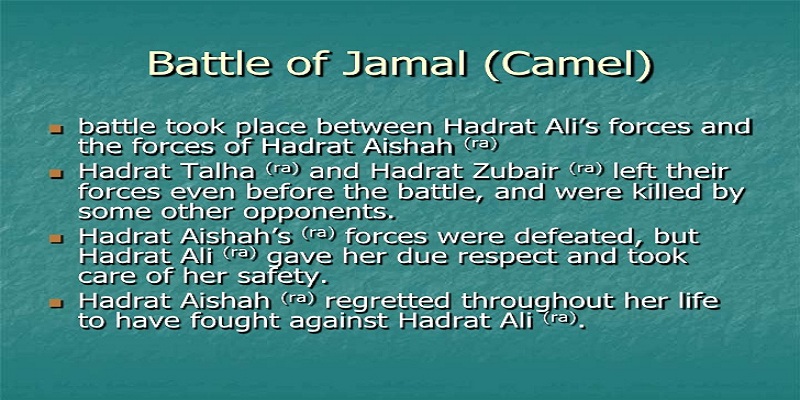It is a brief outline of the Jamal battle in which imam Ali (A) and A'isha as well as some of the companions of the Prophet (P) fights against each other.

The battle of Jamal is called Jamal, which means male camel in Arabic language, because A'isha, the prophet's widow and one of the oppositions to Imam Ali (A), the forth caliph of the Prophet Muhammad (P), in the battle field, was riding a male camel, named Askar, during the war and battle. About the reason behind the battle it must be said that according to Imam Ali (A) A'isha and some of the companions of the prophet were opposed to Imam Ali (A) even during the life of the Prophet (P). [1]
According to Imam Ali (A) when the Prophet (P) preferred Ali (A) to Abu-Bakr (A'isha's father), called and named Ali (A) as his brother, did not close the door of Ali's house to the mosque, and gave the flag in Ali's hands on the day of khaibar battle some of the companions as well as A'isha became anger towards Ali (A); [2] as a result, after the demise of the Prophet (P) they did not accept Ali's caliphate, and when the people pledged allegiance to Ali (A) after Outhman's death the oppositions to Imam Ali (A) waged the war of Jamal Against Ali (A).
Despite the fact that Imam Ali (A) was the legitimate caliph and successor of the prophet Muhammad (P), to whom majority of the Muslims gave full allegiance, A'isha, Talha, Zobair and Mu'awia opposed to his caliphate and waged the Jamal war against Ali (A). Imam Ali (A) fought them and they defeated in that battle but one thing that is of very much importance is the normative conduct of Imam Ali (A) towards the defeated opposition after the battle.
Before the battle and during the war Imam (A) did try his best to guide them into the right path discussing with them and advising them many times but this efforts did not work and finally the battle started. During the battle also Imam tried a lot to convince them not to continue the war but the oppositions did not listen to the Imam (A) and caliph of the Prophet (P). But after the Jamal battle Imam (A) returned A'isha to Mecca respectfully [3] and ordered his soldiers not to capture or kill the rest of the oppositions and he forgave all the people of Basra and did not take their arms and properties. [4]
The normative conduct of Imam Ali (A) in the battle of Jamal shows that Islam is a religion of peace and tolerance, because, the caliph of the Prophet (P) tried his best not to fight rather tried to sign peace agreement and treat all the oppositions especially lady A'isha (A) very kindly and respectfully.
Notes:
[1] See: شیخ مفید، الجمل، ص ۴۱۰-۴۰۹
[2] ibid.
[3] See: احمد بن یحیی بلاذری، انساب الاشراف، ج۲، ص۱۷۸ـ۱۷۹، چاپ محمود فردوس العظم، دمشق ۱۹۹۶ـ۲۰۰۰.
[4] See: ابن قتیبه، الامامة و السیاسة، ج۱، ص۷۷، المعروف بتاریخ الخلفاء، قاهره ۱۳۸۸/۱۹۶۹، چاپ افست قم ۱۳۶۳ش.



